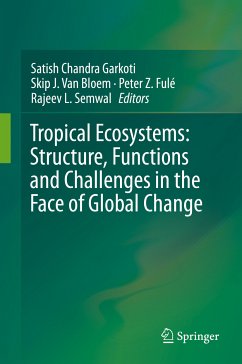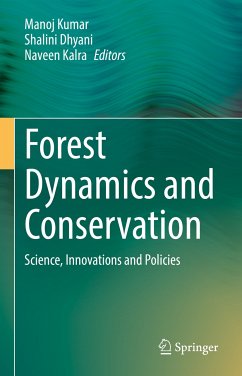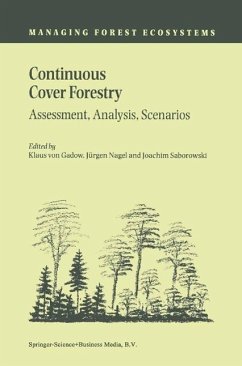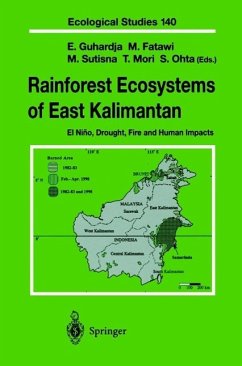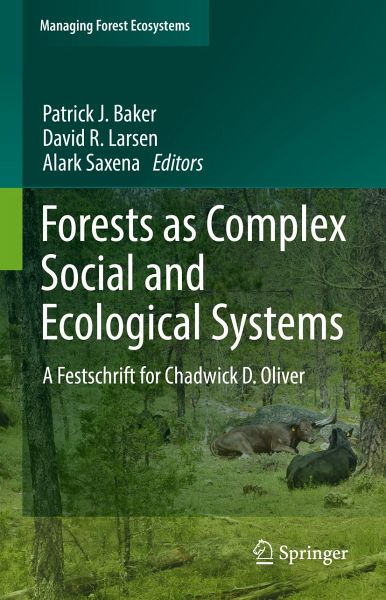
Forests as Complex Social and Ecological Systems (eBook, PDF)
A Festschrift for Chadwick D. Oliver
Redaktion: Baker, Patrick J.; Saxena, Alark; Larsen, David R.
Versandkostenfrei!
Sofort per Download lieferbar
128,95 €
inkl. MwSt.
Weitere Ausgaben:

PAYBACK Punkte
64 °P sammeln!
Professor Chadwick Dearing Oliver has made major intellectual contributions to forest science and natural resources management. Over the course of his career he has actively sought to bring research and practice together through synthesis, outreach, and capacity-building. A common thread throughout his career has been complexity and how we as a society understand and manage complex systems. His work on forest stand dynamics, landscape management, and sustainability have all focused on the emergent properties of complex ecological and/or social systems. This volume celebrates a remarkable caree...
Professor Chadwick Dearing Oliver has made major intellectual contributions to forest science and natural resources management. Over the course of his career he has actively sought to bring research and practice together through synthesis, outreach, and capacity-building. A common thread throughout his career has been complexity and how we as a society understand and manage complex systems. His work on forest stand dynamics, landscape management, and sustainability have all focused on the emergent properties of complex ecological and/or social systems. This volume celebrates a remarkable career through a diverse group of former students and colleagues who work on a wide range of subject areas related to the management of complex natural resource systems.
Over the past decade there has been considerable discussion about forests as complex adaptive systems. Advances in remote sensing, social methods, and data collection and processing have enabled more detailed characterisations of complex natural systems across spatial and temporal scales than ever before. Making sense of these data, however, requires conceptual frameworks that are robust to the complexity of the systems and their inherent dynamics, particularly in the context of global change.
This volume presents a collection of cutting-edge research on natural ecosystems and their dynamics through the lens of complex adaptive systems. ¿It includes contributions by a wide range of authors from academia, NGOs, forest industry, and governmental organisations with diverse perspectives on forests and natural resources management. Each chapter offers new insights into how these systems can be made more resilient to ensure that they provide a diversity of ecological and social values well into the future. Together they provide a robust way of thinking about the many challenges that natural ecosystems face and how we as society may best address them.
Over the past decade there has been considerable discussion about forests as complex adaptive systems. Advances in remote sensing, social methods, and data collection and processing have enabled more detailed characterisations of complex natural systems across spatial and temporal scales than ever before. Making sense of these data, however, requires conceptual frameworks that are robust to the complexity of the systems and their inherent dynamics, particularly in the context of global change.
This volume presents a collection of cutting-edge research on natural ecosystems and their dynamics through the lens of complex adaptive systems. ¿It includes contributions by a wide range of authors from academia, NGOs, forest industry, and governmental organisations with diverse perspectives on forests and natural resources management. Each chapter offers new insights into how these systems can be made more resilient to ensure that they provide a diversity of ecological and social values well into the future. Together they provide a robust way of thinking about the many challenges that natural ecosystems face and how we as society may best address them.
Dieser Download kann aus rechtlichen Gründen nur mit Rechnungsadresse in A, B, BG, CY, CZ, D, DK, EW, E, FIN, F, GR, HR, H, IRL, I, LT, L, LR, M, NL, PL, P, R, S, SLO, SK ausgeliefert werden.





